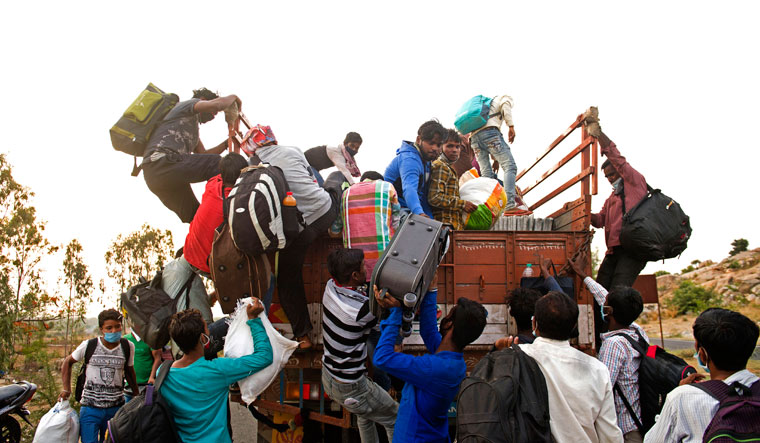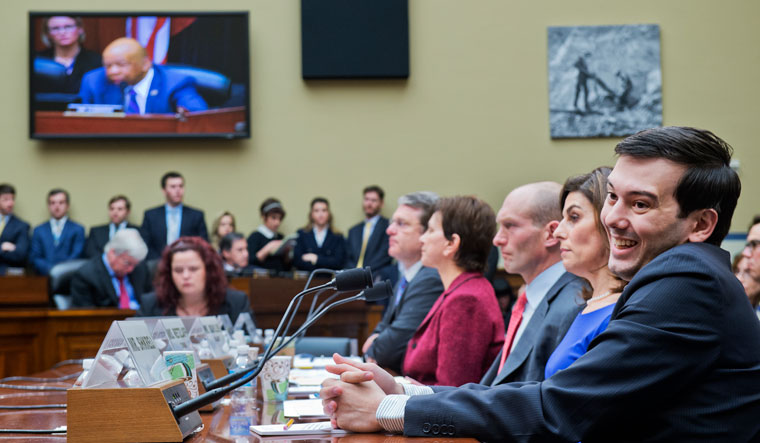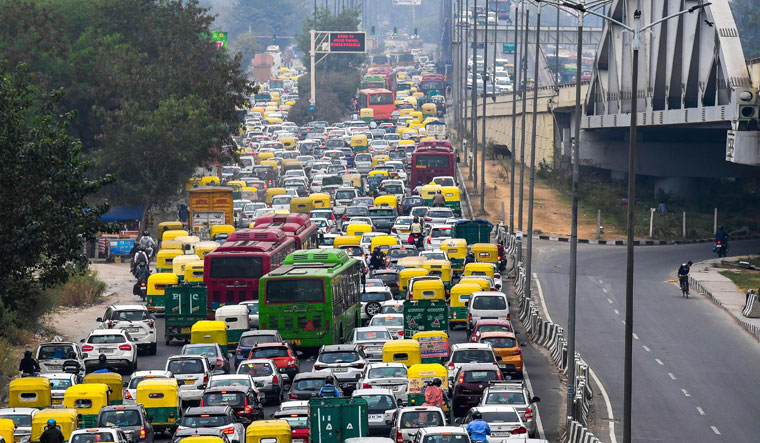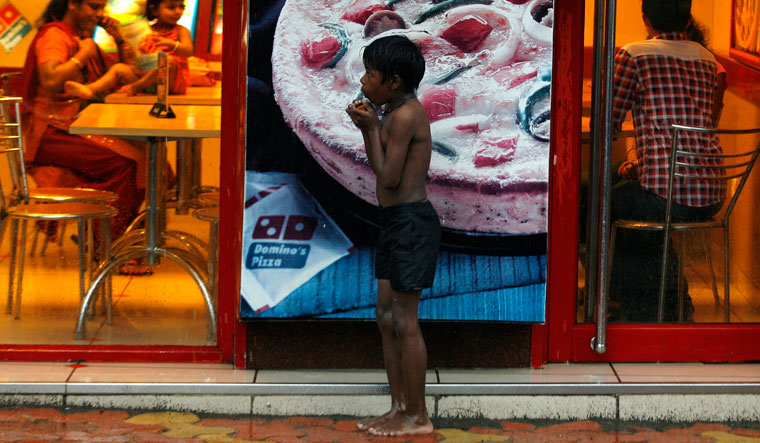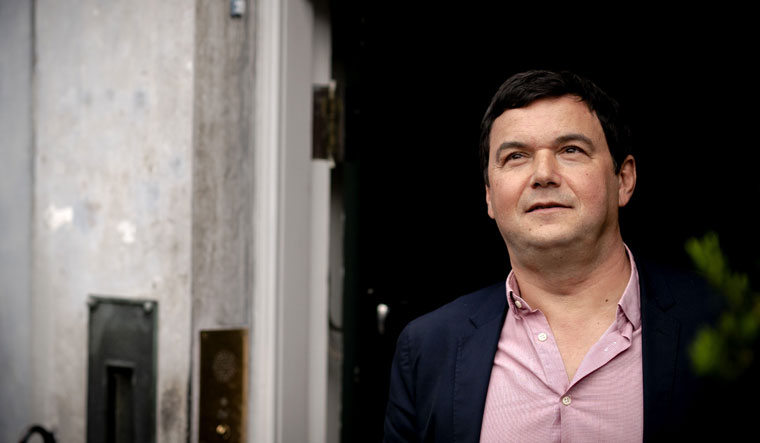For the global economy, the year gone by was an unmitigated disaster, but Covid-19 did not stop capitalism from notching up a few records. In August, Amazon founder Jeff Bezos accumulated a record net worth of $200 billion and became richer than 140 countries. The same month, Apple crossed $2 trillion in market capitalisation.
By October, the combined wealth of dollar billionaires stood at $10.2 trillion, a 70 per cent increase over the past three years. The world’s 500 richest people collectively gained $1.3 trillion this year, with Elon Musk alone adding more than $100 billion. But, for millions of ordinary people, the year was a nightmare. Thousands of migrant labourers in India had to walk hundreds of miles to their villages. The heartbreaking picture of a father holding his child and clinging on to an overcrowded truck in a desperate attempt to reach home was a stark reminder of our unequal world. A World Bank report released in October estimates that the pandemic will push 11 crore people to extreme poverty as we say goodbye to 2020.
Two recent works stand out for their excellent research and inquiry into the ideological underpinnings of economic inequality around us. French economist Thomas Piketty argues in Capital and Ideology that, for the first time in history, the poor are being blamed for their misery. They are condemned for lack of talent, diligence and virtue, while the rich are commended for their merit and entrepreneurship.
The second outstanding work is Harvard professor Michael J. Sandel’s The Tyranny of Merit: What’s Become of the Common Good. Sandel writes that Donald Trump’s victory in the 2016 US presidential elections and the vote for Brexit in the UK were angry verdicts on “decades of rising inequality and a version of globalisation that benefits those at the top but leaves ordinary citizens feeling disempowered”. He says the root cause of this popular anger is the meritocratic justification of inequality. The rich feel that they are entitled to the just rewards of their merit and the poor are left with a feeling of humiliation and resentment.
American businessman and convicted felon Martin Shkreli’s argument that profit is a good thing to sustain corporate existence arises from this feeling of meritocratic entitlement. Shkreli is the founder of Turing Pharmaceuticals that produced Daraprim, a drug used in the treatment of malaria, toxoplasmosis and HIV. The drug was originally owned by another pharmaceutical company. Upon acquisition, Turing increased the price of the drug from $13.50 per tablet to $750. Shkreli justified this 5,000 per cent hike on the need for making profits. The 37-year-old is now serving time in a federal prison in Pennsylvania, after being convicted in a securities fraud case.
Meritocratic argument was at the centre of a public interest litigation in the Delhi High Court in 2012. The petitioners challenged the construction of a bus rapid transit corridor in Delhi, arguing that the BRT would increase by about 20 minutes the travelling time of “wealth creators” such as managers and directors. The court rejected the contention, observing that without the meaningful support of labour, capital would not be able to create any wealth. It is another matter that the BRT project was shelved later because of the criticism that it caused huge traffic blocks.
The thought process behind the BRT legal challenge is not an exception. There have been instances where even the Supreme Court was swayed by the virtues of corporates. Rejecting a petition that challenged the construction of a mall in Delhi’s ecologically vulnerable ridge area without required permissions, the court observed that unlike individuals, corporates did not indulge in malpractices for getting approvals.
The impact of inequality on law, and the role of law in addressing inequality, have been examined quite extensively. There is a growing realisation that rising inequality is a threat not only to rule of law, but also to the very idea of constitutional governance and democracy. Economic inequality and increased acceptance of authoritarian rule go hand in hand. Also, inequality is significantly higher in democracies that degenerate into autocracies. As Justice Louis Brandeis of the US supreme court said with prescience a century ago, “We may have democracy, or we may have wealth concentrated in the hands of a few, but we cannot have both.”
What is the role of law in addressing economic inequality? One view is that progressive taxation is the best way and that any other intervention would further distort markets. Another view is that law can play a meaningful role in tackling inequality and reducing poverty. The need for such an intervention arises from the belief that capitalism itself is a product of law and, therefore, law should intervene to course-correct it. Two major pillars of capitalism are right to property and freedom to contract, both inventions of law. Income inequality is growing mainly because of the adoption of neoliberal economic policies. For example, the World Inequality Database shows a sharp increase in inequality in India from the 1990s after the liberalisation of the economy. Liberalisation reduced governmental regulation, promoted disinvestment of public sector undertakings, brought about changes in the taxation policy and reduced government spending in welfare measures.
Many people, therefore, advocate antitrust law or competition law as a major legal tool to address economic inequality. The enactment of antitrust laws in the US had income distribution as one of its primary objectives. The Sherman Act of 1890, which heralded the beginning of competition law, came at an inflection point in America’s political history. The common man, especially the farmer, was at the receiving end of a new entity called trusts, through which industrialists in a sector joined hands and fixed prices and output. The Standard Oil Trust founded by John D. Rockefeller (1839–1937) is a prominent example. The company was a pioneer in adopting unscrupulous business practices to maximise profits. The Rockefeller empire was built by either taking over rival companies or cooperating with them. In the 19th century, there was cut-throat competition among oil refiners. Standard Oil beat competition by signing favourable transport contracts with railroad companies and by acquiring vital pipelines. The collusion with railroad companies gave it not only favourable freight rates, but also crucial information about the volume of trade of competitors.
The Sherman Act outlawed these trusts and all other forms of monopoly. Anti-competitive agreements like price fixing and market sharing were outlawed. Mergers and acquisitions were brought under scrutiny to ensure that they did not lead to concentration in the market. Standard Oil was broken into 34 companies in 1911.
A radical shift, however, happened in the enforcement of antitrust laws in the 1980s, influenced by the economic policies of president Ronald Reagan who preferred a reduced role for government in the market. A group of economists at the University of Chicago argued for a reduced role of antitrust law in a market economy. The university had been founded with a Rockefeller donation. Seeing great merit in the market and its self-correcting nature, these economists reasoned that the only purpose of antitrust law was to enhance consumer welfare and that the law should involve itself only in those practices where the consumer was affected. This approach had a significant impact, especially as mergers and acquisitions were treated with leniency. It facilitated economic growth, but led to concentration of wealth. This happened in two ways. By reducing competition, the prices of essential commodities went up, affecting the poor more. Second, it resulted in job losses and wage suppression because of the reduced bargaining power of the worker. The big corporations were in a better position to control wages and other benefits.
The limits of such an approach are magnified in big tech companies. The World Bank publication Digital Dividends (2016) documents how digital technology can exacerbate inequality. It shows that the dominant position of online platforms and internet intermediaries can lead to exclusionary abuses like buying out competitors and predatory pricing. Exploitative abuses like imposing unilateral policies are also common. For example, Google, in 20 years, acquired 260 companies with an eye on the technologies they developed. Similarly, Amazon acquired 100 competitors to retain its dominance. Facebook’s acquisition strategy is also well known. Collectively Amazon, Facebook, Google and Apple have acquired more than 500 companies. The Chicago economists’ approach accepted by the US supreme court makes competition law toothless in these situations. The major hurdle that competition law faces here is that most of the services rendered by these companies are either free or offered at a reduced price. As consumer welfare is the sole objective of competition law, it presents problems for intervention as consumer welfare is not affected.
The limitations of competition law to rein in tech companies was highlighted by a US house of representatives’ subcommittee report, Investigation of Competition in Digital Markets, published in October. The 450-page report noted that the current approach focused solely on consumer welfare was against the original intent of antitrust laws. It recommended amendments to clarify that antitrust laws are designed to protect not just consumers, but also workers, entrepreneurs, independent businesses, open markets, a fair economy and democratic ideals. With Joe Biden winning the presidential elections and Democrats retaining their majority in the house of representatives, the control of the senate after the run-off elections in Georgia will be crucial. If the Democrats manage to win the two Georgia seats, there is a greater possibility that these changes would be brought about.
The recent action by competition authorities around the world, including the US, the European Union and India, against Google will be a test case to ascertain the efficacy of competition law in digital markets. The main complaint against Google is that it was using its monopoly position, gained as a result of owning the Android operating system, to insist on preloading its search engine and prohibiting pre-installation of competing search engines. On December 9, the US federal government and more than 40 states filed lawsuits against Facebook in the US district court for the District of Columbia, accusing the tech giant of illegally targeting competition. They said Facebook’s purchases, especially of Instagram and WhatsApp, were aimed at eliminating competition.
It is, however, doubtful whether competition law is an effective tool to tackle the ever-expanding power of multinational corporations. Even the United States with its strict antitrust laws has not always been successful in this regard. The banana litigation of early 20th century showed the limits of extraterritorial antitrust enforcement. The United Fruit Company, a New Jersey-based corporation which enjoyed monopoly over banana plantations in Latin America, chose to target the American Banana Company, a business rival that posed a challenge to its monopolistic position. The American Banana Company was in the process of constructing a railway line across Latin America to transport bananas from its plantations for export to the US. The United Fruit Company initially tried to buy out the competitor. After the attempt failed, it instigated officials in Costa Rica to seize the plantations and railways. Deprived of its property and driven out of business, the American Banana Company filed a suit for compensation under antitrust laws in the US. But the complaint was dismissed as the activities took place outside the US. Interestingly, when Pablo Neruda wrote a poem in the 1950s about American imperialist policies in Latin America, he titled it “The United Fruit Company”.
The antibiotic cartel case in the late 1970s is also instructive. An investigation in the US revealed that a group of broad spectrum antibiotic producers, including Pfizer, had formed a cartel and fixed prices and divided markets, including India and many other developing countries. India, the Philippines and Iran approached American courts for compensation for the excessive prices charged by the companies. India preferred to use American law and American courts thinking those would be more effective. The US supreme court, however, rejected the case on the ground that a foreign country could not sue under the antitrust law. This is a reminder of how ineffective the protection is when faced with MNCs.
India in the 21st century, however, is not the India of the 1970s. It is an emerging economy and a huge market. Even then, there are many factors that inhibit competition enforcement in India. The first question is of accessibility. In the US, a citizen can approach a federal court and file a complaint about an anticompetitive practice and can get a hefty compensation. But in India, the Competition Commission of India situated in Delhi alone can deal with complaints. The Competition Act had provided for regional benches, but an amendment in 2007 abolished them. Second, in the US, the violation of antitrust laws can lead to punishments, as the Sherman Act is a criminal statute. Many executives have undergone prison terms for antitrust violations. In India, competition law violations entail only structural remedies or fines. Third, the delays in deciding appeals make many of the remedies meaningless. Even though the CCI has imposed hefty fines in many instances, these are under appeal and thus allows companies to buy time. Further, at a policy level, it must be seen how a country that badly needs foreign direct investment will deal with anti-competitive practices of MNCs. In that sense, the effectiveness of competition law to bridge economic inequality in a country like India is doubtful.
—The author is professor of law, Sai University, Chennai.




